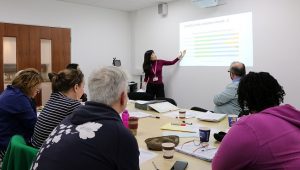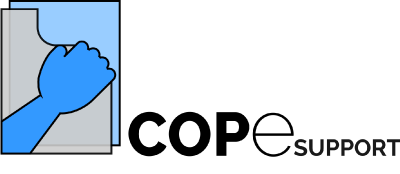Background
Psychosis is a medical term to describe a mental illness which commonly includes a range of distressing symptoms such as hallucinations, delusions and paranoia. Coping with psychosis is often a challenging demand for the individual as well as everyone close to them, including family and friends. The term “carers” refers to people who provide caring support on an unpaid basis. Caring for a loved one affected by psychosis can be a daunting experience, but we know from previous research that information on the illness, coping strategies and opportunities to share experiences and support with other carers could help.
These are the impetus behind the EFFIP project. We are working toward developing and evaluating an online resource for carers, called COPe-support (Carers fOr People with Psychosis e-support resource). COPe-support is our online resource acronym and website domain name chosen by the many carers and people with lived experience of psychosis involved in the EFFIP project.
The project
 EFFIP is a 5-year research project aiming to develop and evaluate an online resource for carers. The e-support resource is dedicated for carers to gain information about psychosis and glean support and advice from others in the same position.
EFFIP is a 5-year research project aiming to develop and evaluate an online resource for carers. The e-support resource is dedicated for carers to gain information about psychosis and glean support and advice from others in the same position.
2016 – Development phase
We focused on developmental work to identify essential ingredients and considerations in designing our e-support resource. We achieved this through conducting two reviews on literature and a focus group study with service users and carers.
You can find the two literature reviews at the links below:
Sin, J., Henderson, C., Spain, D., Cornelius, V., Chen, T., & Gillard, S. (2018). eHealth interventions for family carers of people with long term illness: A promising approach? Clinical Psychology Review. https://doi.org/10.1016/j.cpr.2018.01.008
Sin, J., Gillard, S., Spain, D., Cornelius, V., Chen, T., & Henderson, C. (2017). Effectiveness of psychoeducational interventions for family carers of people with psychosis: A systematic review and meta-analysis. Clinical Psychology Review. https://doi.org/10.1016/j.cpr.2017.05.002
2017-2018 – Modelling and Piloting phase
 We worked on building the e-support resource taking on board findings from the developmental phase, and with advice and input from an Expert Advisory Group (EAG) and iterative consultations with carers. We have documented this innovative digital intervention build process in this paper:
We worked on building the e-support resource taking on board findings from the developmental phase, and with advice and input from an Expert Advisory Group (EAG) and iterative consultations with carers. We have documented this innovative digital intervention build process in this paper:
Sin, J., Henderson, C., Woodham, L. A., Hernández, A. S., & Gillard, S. (2019). A multicomponent ehealth intervention for family carers for people affected by psychosis: A coproduced design and build study. Journal of Medical Internet Research. https://doi.org/10.2196/14374
Once COPe-support was built, we ran a study to establish the usability of the resource-prototype and to refine it further based on feedback. The usability study is reported in this paper:
Sin, J., Woodham, L. A., Henderson, C., Williams, E., Sesé Hernández, A., & Gillard, S. (2019). Usability evaluation of an eHealth intervention for family carers of individuals affected by psychosis: A mixed-method study. Digital Health. https://doi.org/10.1177/2055207619871148
2018-2020 – Evaluation phase
We conducted a nationwide online randomised controlled trial (RCT) of COPe-support to evaluate its effectiveness in improving carers’ wellbeing and caregiving experience.
Here are some papers we have published about the RCT:
The RCT protocol of COPe-support:
Sin, J., Henderson, C., Cornelius, V., Chen, T., Elkes, J., Woodham, L. A., … Gillard, S. (2020). COPe-support- A multi-component digital intervention for family carers for people affected by psychosis: Study protocol for a randomized controlled trial. BMC Psychiatry. https://doi.org/10.1186/s12888-020-02528-w
A paper reporting the mental health outcomes of carers who joined the RCT:
Mental health and caregiving experiences of family carer supporting people with psychosis. Epidemiology and Psychiatric Sciences. https://doi.org/10.1017/S2045796020001067.
A paper reporting an interview study of participants and their experiences of the tool:
Perceived acceptability and experiences of a digital psychoeducation and peer support intervention (COPe-support): Interview study with carers supporting individuals with psychosis. Journal of Medical Internet Research. https://www.jmir.org/2022/2/e27781
A paper reporting the results from the RCT:
Effect of digital psychoeducation and peer support on the mental health of family carers supporting individuals with psychosis in England (COPe-support): a randomised clinical trial. Lancet Digital Health. https://doi.org/10.1016/S2589-7500(22)00031-0
A lay summary providing a brief description of the project and its results:
Funding acknowledgement
This project is funded by the National Institute for Health Research http://www.nihr.ac.uk/ (NIHR Post Doctoral Fellowship, Dr Jacqueline Sin, PDF-2015-08-035).
The views expressed in this website and related publications are those of the author(s) and not necessarily those of the NHS, the National Institute for Health Research or the Department of Health and Social Care.
